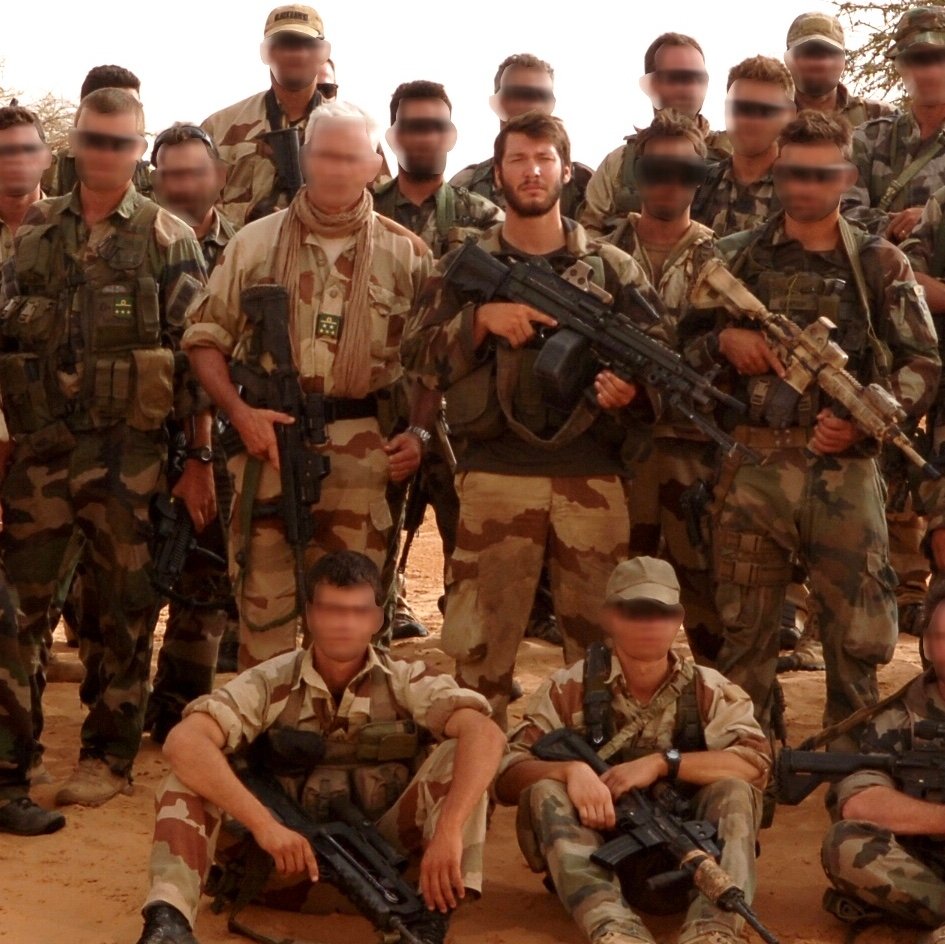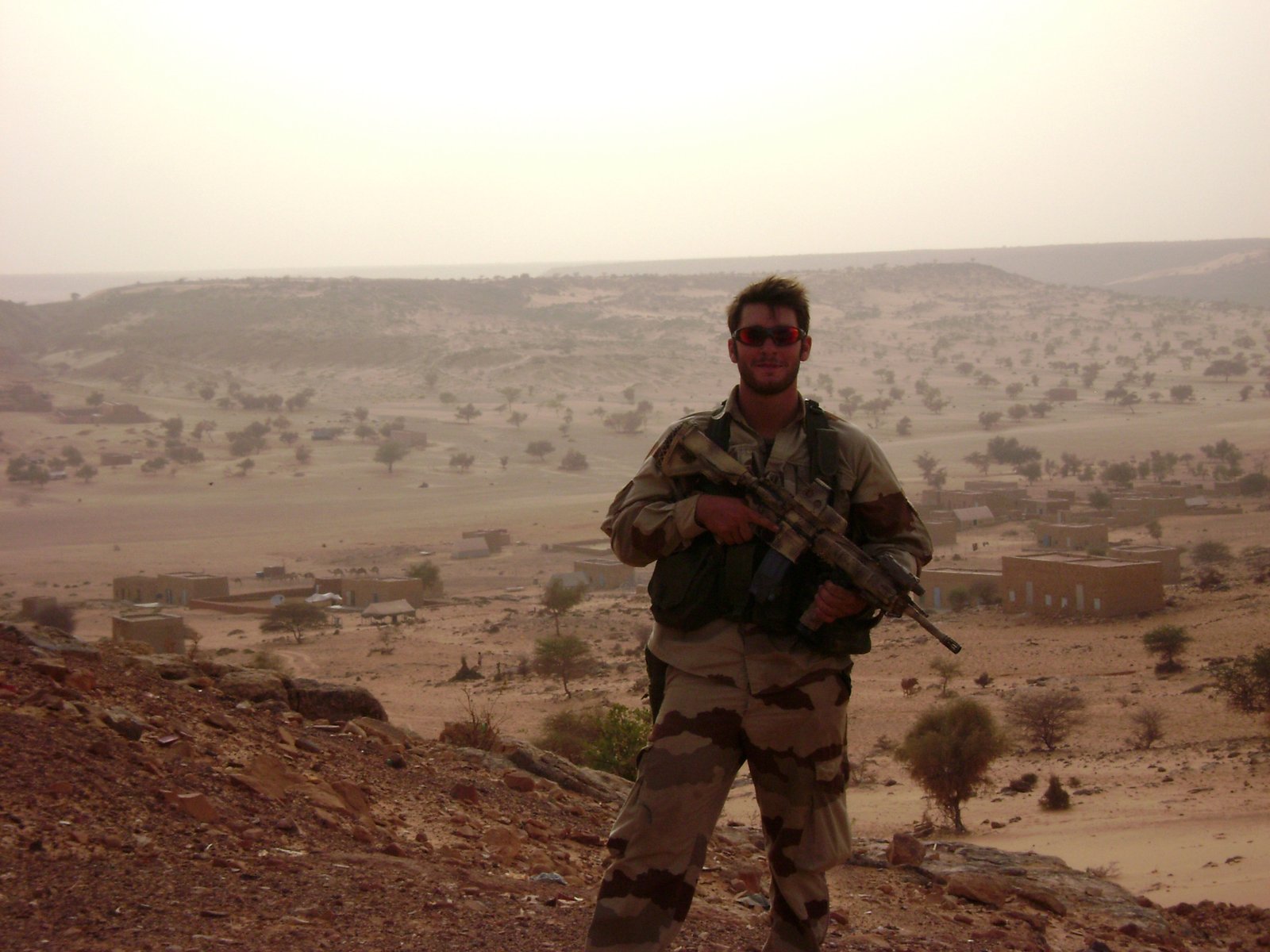Old Special Forces operator (FS) french (1st RPIMA), military advisor (for clients as diverse and varied as Ubisoft, manufacturers for tests and retexes on prototypes or even a British private security company), partner of a shooting complex (Subtac) in the Parisian suburb of Villebon-sur-Yvette, Alex has a very busy schedule.
The therefore relies on 7 former colleagues from his unit to whom he entrusts the consulting and training services that he is not able to provide.
He has just returned from Northern Ireland where he was in charge for a pharmaceutical company to set up checkpoints on 3 sensitive antennas (research, production, distribution) and so prevent infected persons from entering these sites at the risk of infecting essential employees. For this mission, he was able to transfer his experience acquired during the hunt for terrorists in the search for symptoms in people infected with Covid 19.
He is also very present on Instagram (@alex_french_sas) with over 14,000 subscribers and very followed lives where he takes the time to answer all the questions that we can ask ourselves about the elite units. The tone is relaxed but knows how to be serious when the situation demands it (commemorating those who died in operations or national holidays). Always take up the challenge and succeed, that’s his goal.
His CV
Former versatile FS operator (SAS1 group of the first company), commando instructor, combat shooting instructor, C4 instructor (melee), explosive specialist, ERYX shooter (missile launcher), Minimi shooter (mini-machine gun), high-speed VPS pilot (piloting courses), soft break-in specialist, SAS monitor (SAS combat tactics), bodyguard …
On mission: Cteam leader, explosive manager, health manager (Combat First Aid 1 training only but trained with the main referent of his SC2 group who was keen to share his experience and whom he had to replace)
After the BAC, my parents, like all parents, wanted me to study so I started a preparatory class MATH SUP to be an engineer. I have not finished the year. I went to CIRFA where I submitted an application for the infantry. I was directed to Saint-Maixent. As I thought I would be taken right away, I stopped everything. But, it didn’t turn out that way and I found myself having to find a job while waiting for my incorporation. So I was a delivery driver at Rungis for almost a year. I continued my physical preparation and when I was called my motivation was at its peak. I always see the positive in any situation. By making my deliveries, with the map of the region on my knees (no GPS at the time), I was able to continue to improve my topography and I strengthened my ability to work independently.
Sa military career
In Saint-Maixent, I finished 3rd and there are only 2 places for the 1st RPIMA. The first is taken by a friend who has done all his training with me. And the one who arrives 2nd does not choose the 1st RPIMA because he is not suitable because of poor eyesight therefore I am taken. You should know that trying to enter FS via Saint-Maixent or Saint-Cyr is Russian roulette because places are played at a few hundredths of a point.
Before starting the RAPAS training (former name of the SAS sector), I am sent to CT1 00 (Infantry group leader) in Montpellier (at the time, today in Draguignan) to have a little more skills before attacking the CT1 RAPAS which is very hard. JHe also passes in this course the Level 2 Commando of the CNEC (Level 1 obtained in Saint-Maixent). I finished 1st on the 2 tests. Then I finally attack my CT1 RAPAS in the regiment and I finish 2nd, which is very rare for a young and inexperienced direct sergeant.
I have always stayed in the same regiment and the same group for almost 10 years : the 1st group of 1st company (SAS1 or SAS Kick Ass formerly RAPAS Kick Ass). There was a shigh team spirit, strong characters too but who managed to work together. I had nowant to change group because it gave me complete satisfaction. In addition, we were lucky to have missions with a lot of real operations. For example, we participated in a hostage release, experienced fire situations, found IED factories (Improvised Explosive Device otherwise called Improvised Explosive Device, EEI, or Circumstantial Explosive Devices, EEC) and carried out several pr missionsClose protection (we were all trained in the 2 courses of the 1st RPIMA: SAS course and close protection) in tense situations with evacuation of VIPs … I was in all the theaters of the French army between 2006 and 2015. I participated in all 8 OPEX and I am very happy with the experience I had. VShis job brings you great wealth and maturity, makes you meet incredible people, travel, feel useful by being an actor in the news instead of stand idly by watching the news.

Sweaknesses
I have a big reading problem since I was a child. I understand what I read very well, but I read extremely slowly. It’s been a real problem since elementary school, especially in French obviously. I have therefore never been able to read a single book in my life. I completely lose track as soon as there are more than a few pages. Eager to learn in spite of everything, I manage to read summaries, articles, I watch reports but I get most of my knowledge from oral transmission. This was obviously a big weak point during the theoretical training phases.
I was also very bad at language at school, that’s also why I finished 3rd at St Maixent and it could have cost me my place at 1st RPIMA. Except that in my job, I had to work with the English, the Americans, the Afghans, the Mauritanians, the Germans, the Poles, … My apprenticeship was painful but I finally understood the interest and, today ‘ hui, i am fluent in english.
I have a winner’s mind, which is as much a quality as a flaw. I have a very great confidence in me but it sometimes makes me put myself in danger, risk everything and, in business, put all the money in one basket. Beware of excess. Self-confidence allows you to have the energy to try things, always push your limits but the risk is also that, often, you find yourself a little ahead of others, you always find yourself a little leader. of a group during training and we are also more exposed if we crash. Mistakes are less visible when you are in the crowd. As long as it succeeds, it pays off and we end up in the 1st of the standings but when this is not the case, it shows and there we go down into the depths. And it’s very tiring to be responsible during your training. In addition, we must be careful that self-confidence does not become arrogance that would end up annoying managers and colleagues. For me, it started off a little badly at Saint-Maixent. I didn’t have a family in the military, didn’t go to military high school, and struggled to adjust to military life. Topography was an area I mastered, maybe even more than the instructor, and I wanted to do my know-it-all which was the worst thing to do. Especially since I did not do it to move the group forward but to show that I knew more than the others. I realized it and corrected it right away but he had already taken a hold of me even though it didn’t last. So we don’t bring it back during an instruction because we have everything to learn. And we only ask a question when we want to hear the answer, not when we want to show that we already know it. It is very annoying for the instructor and it will cause problems afterwards.
Shis strengths
I am, a priori, a good leader. You have to be the one who is always willing to sacrifice yourself for others, take the responsibilities that no one wants to take and not the arrogant little boss who pushes others around him by saying that he is the best. You have to be the leader who pulls others up and from then on everyone follows you. This is really what happened to me during my training.
I am excellent in topography because, when I was younger, I was orienteering and hiking independently with friends. I am very comfortable with maps and have always had the best grades. In addition, your leadership is put to the test if you are not good at topo. If you don’t know where you are going, persondon’t follow you. A mThe key oment in all training is to do night walks and if the person you trust the most to get from point A to point B, in the least possible time and with the least fatigue, it is you , then inevitably you become a natural leader. And that’s a big force.
I am pedagogue and I also have facilities to transmit what I know. When you are going to ask your team for something that is not necessarily easy and / or that is not necessarily unanimous, you have to be able to be a teacher and be convincing to explain the why and the how. This is how you get the membership of your group. I’m not the type of leader who demands it. I’m the type of leader who gets people to buy into his ideas.
I do not have not really from physical flaw and I am psychologically balanced. I have good cardio, I am enduring, strong and fast. I’ve always been pretty muscular and strong but that never stopped me from being good at climbing, running or swimming. I’m not good at any of those sports, but I’m not bad at any.

The sacrifices necessary to do this job
This job involves a lot of sacrifices. Your personal life is completely different from that of a normal person because you are never there. During training, we are not available. We work all week or even the weekend. We don’t often have vacations or public holidays. When we are operational, we are deployed 4 to 8 months a year. And when we come back, we have 2 months of vacation but we don’t necessarily have the time to take it all. You also have to go through new qualifying courses, train with your group and that leaves very little time for family and friends other than those you make in the regiment. And it is very hard. I was lucky to have a girlfriend who followed me throughout my career and who never let go of me because she had a fulfilling professional life. She accepted my absences, supported me and gave me a lot of emotional stability. We are doing a difficult job, the morale gauge is already almost full and in addition, we are faced with missions where we see tough things. At the 1st RPIMA, 3 out of 4 marriages fail with the childcare problems that this implies. And I am not talking about those who cannot find a partner to follow them in this particular life.

